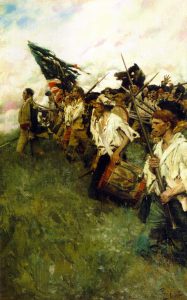
When the Declaration of Independence was signed the Thirteen Colonies had been at war with Great Britain for more than a year.
It was a statement of principles. Under these principles and Thirteen Colonies would then set up a system of organization. That would come later and only after a decade, I think. They first tried the Articles of Confederation before they worked out the Constitution.
Constitutions are important because they set out the rules of the game and a method by which the rules could be changed, with the consent of the governed.
These were astounding and thrilling ideas.
At the time my ancestor Edward Giles was a magistrate in North Carolina, and he had been a magistrate (one of fifteen) on the Court of Quarter Sessions under the British Crown for more than ten years. He by that time had two sons and several daughters. He continued to sit on the court (after all, people die and need death certificates, they sell land and need land titles, they need wills witnessed and they must be married) but according to an invoice issued from the Continental Congress he supplied several wagonloads of corn to the North Carolina troops. I imagine his son Nathaniel fought, but we can find no record, which is not unusual. It was guerilla warfare down there in the hills.
The Court of Quarter Sessions moved from house to house and town to town to keep ahead of the British, invading from South Carolina, but still they held their sessions. If they had been caught, since they were on the side of the Patriots, they would have been hung or shot. Edward Giles, by this time probably more than sixty years old, sat as a magistrate along with his colleagues and kept the business of the county on an even keel. This would be Mecklenberg County.
And so that’s my little story about the Revolutionary War. If Edward Giles heard of the Declaration of Independence, as a magistrate he would have studied it carefully. But I think copies were hard to come by and distributed mostly in the New England colonies.
